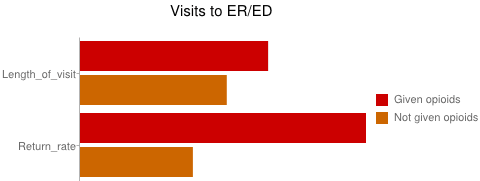More Concerns About Narcotics in a Migraine Emergency
New studies are reinforcing concerns about hospitals that are still giving narcotics, otherwise known as opioids, for treatment of migraine in the emergency room. Common examples include hydromorphone and meperidine (Demerol).
Many years ago, when we didn’t have the migraine treatments that are available today, treatment with opioids was common. But today, after much more research and having many more options, these types of medications are a long way down the list of recommended treatments.
A study published this past November in the journal Cephalalgia illustrates some of that research. The study, out of Stanford University in the USA, reviewed the charts of 574 patients who visited the ER/ED with some kind of headache disorder, such as migraine accompanied by headache. You can see the results below
Patients who were given opioids/narcotics tended to stay in the ER/ED more than an hour longer (5 hours as opposed to almost 4). In the next seven days, patients who were given opioids were more than twice as likely to return.
Not only are health professionals and patients interested in these numbers, so are the people who are crunching the numbers – that’s quite an economic impact when migraine is such a common disability around the world.
There are some limitations in this study. It would be helpful to know why patients were prescribed opioids. Were the opioids causing the longer stays in every case, or were the headaches worse, or of a different type? However, this study isn’t alone. Even back in 2008 we talked about a study involving Demerol, which showed that it tended to be less helpful for patients than other options. To put it simply, there are other medications that tend to do a better job at fighting the headache.
Although we should be careful not to go to an extreme and say that all opioids are evil and should never be an option, the evidence is showing that they should be used rarely. And the problem right now is that they’re being used far more often than they should be, based on the research.
But this is important if you’re a patient: If you are in emergency with a headache, and you aren’t given a narcotic, don’t assume that they think you’re a drug-seeker. Don’t assume they’re not listening to you, or not taking you seriously. And don’t even assume they’re trying to save money at your expense.
More likely, they have found that there are other treatments that will probably work better for you, in both the short term and long term, with fewer side effects.
And if you’re working in the ER/ED as a health professional, and your department is still giving a high number of opioids to migraine patients, review some of the latest evidence and recommendations to find the best treatment for your patients.
For more information:
